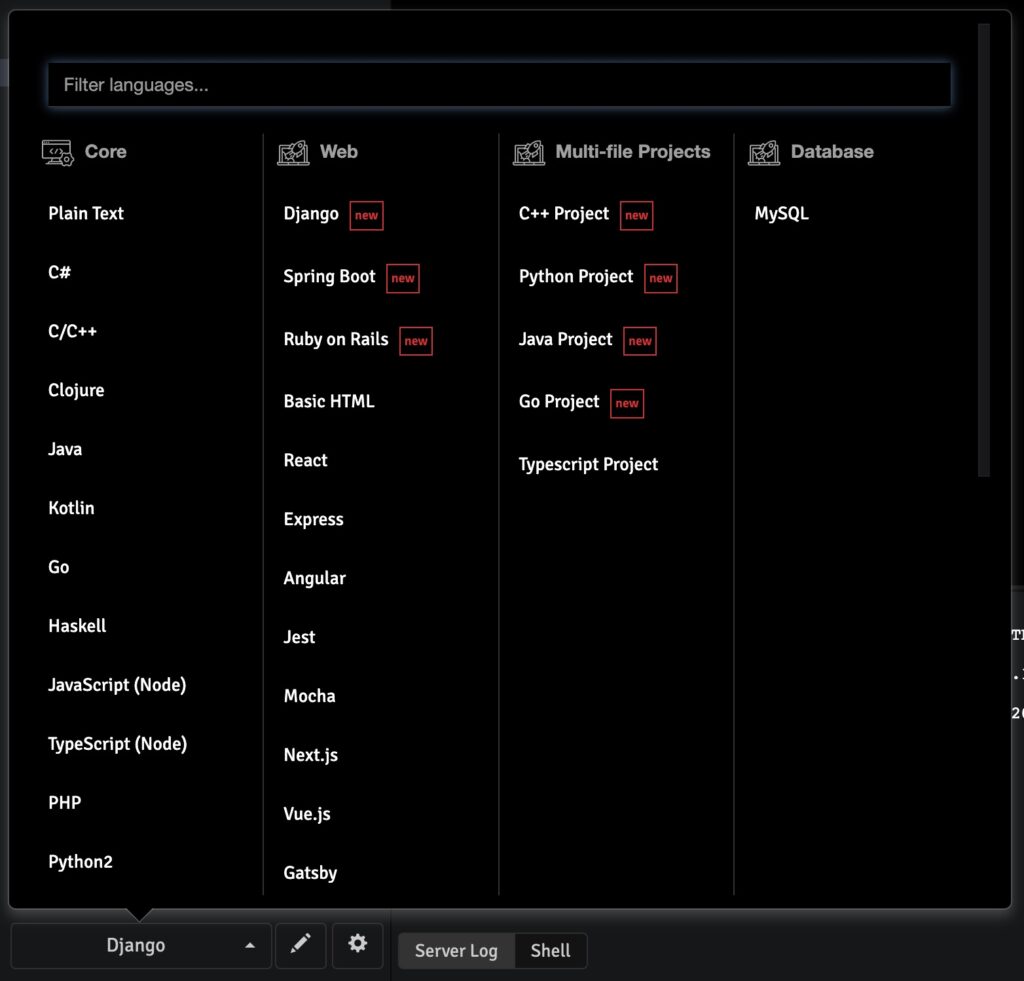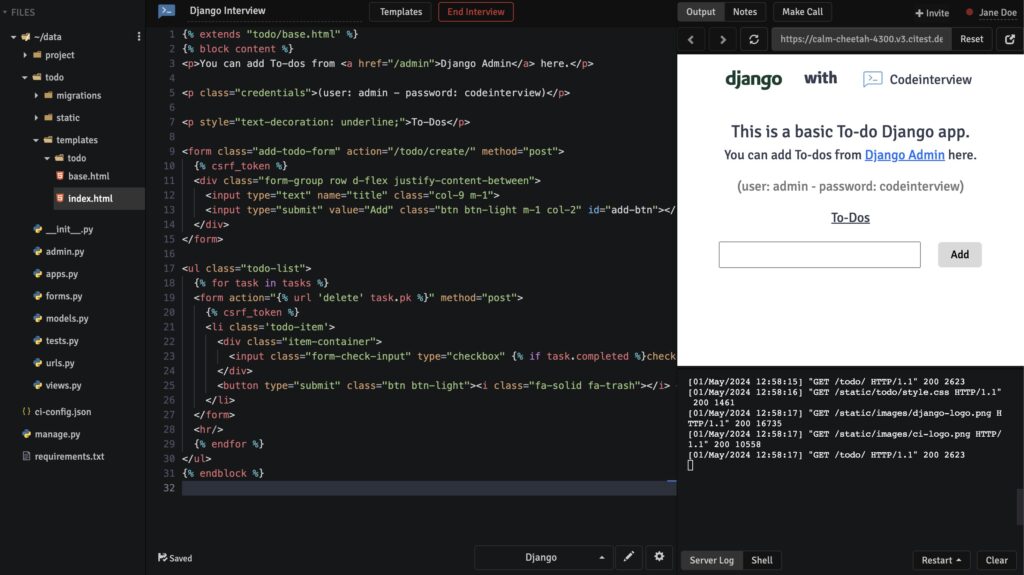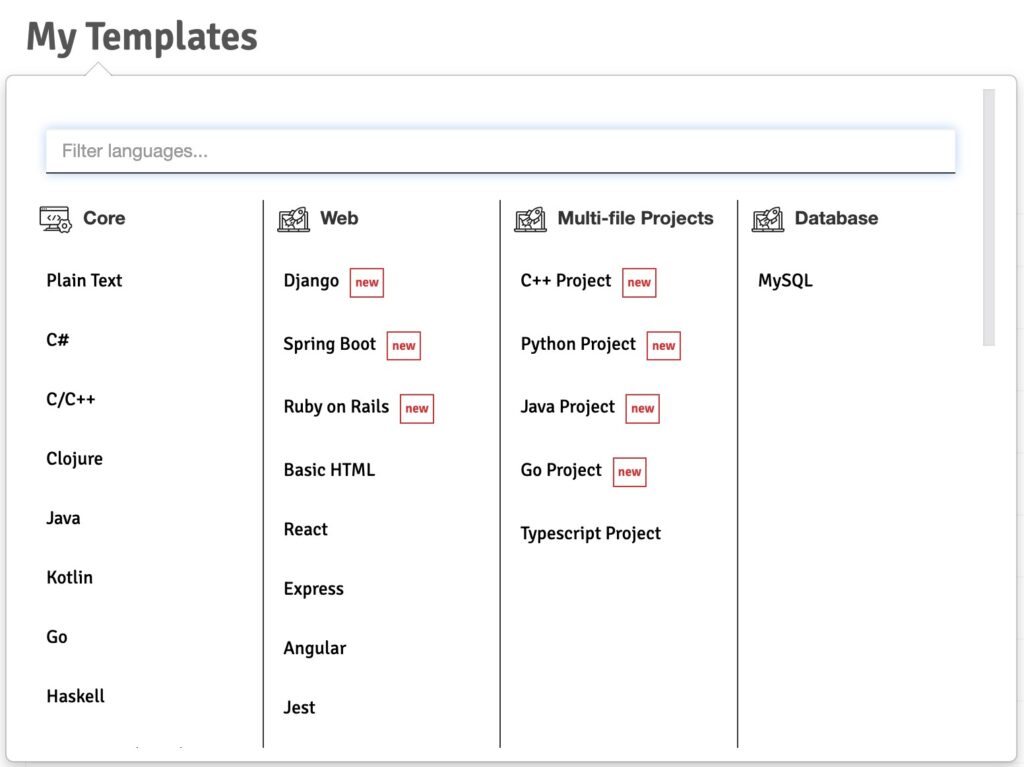It’s imperative for a remote technical interview to assess a candidate’s skills by challenging them with tasks similar to those that they are expected to tackle on the job.
Last year, we expanded our platform to include frontend frameworks such as React and Angular, enhancing our realistic interview environment. Now, following on the same lines, we are thrilled to introduce the most popular backend frameworks on our platform.
Django, Ruby on Rails and Spring Boot.
This update enables candidates to demonstrate their true proficiency and problem-solving skills, providing employers with clear insights into their real-world potential.
Experience the Demo Yourself—Try It Now!
About the Backend Frameworks
Here is a little introduction for each of these frameworks:
Django
Django, a high-level Python framework, excels in building clean and pragmatic designs. It enables rapid development of secure and scalable web applications, making it ideal for modern web environments that demand efficiency and robustness.
Ruby on Rails
Ruby on Rails online environment offers a streamlined approach to web application development with its “convention over configuration” philosophy. This framework facilitates the rapid creation of rich, database-backed web applications by simplifying many common challenges.
Spring Boot
Spring is a powerful Java-based framework known for its comprehensive infrastructure support for developing complex applications. It’s widely acclaimed for enhancing application performance and integrating enterprise systems seamlessly. Spring Boot makes it easy to create stand-alone, production-grade spring-based Applications.
Use the Backend Frameworks
These popular backend frameworks are accessible in our collaborative interview environment through the language selector panel.

Once you have selected either of these new frameworks, it should load instantly. Once loaded you can now experience the multi-file support. You can access the whole framework via the Files panel.

All of these backend frameworks come with a pre-built “to do” sample application. This working application acts as a bootstrap for you to start your environment preparation as quickly as possible.
Shell
We have enabled an interactive shell to help interviewers and candidates interact with the framework in a more familiar manner as in real-life tasks. This shell is accessible via the Shell tab provided in the bottom right half of the screen.
Installing Packages and Dependencies
These new environments come with the support of installing any required packages or dependencies. You can install such packages using the shell tab.
Server Log
These new environments also come with the support of a log panel. This panel is accessible via the Server Log tab in the bottom right half of the screen. This panel shows all the server logs of these frameworks as they are serving the output to the web preview panel.
These server logs can be extremely helpful during the technical interview assessment for both the candidates and interviewers.
Web Preview
All of these backend framework environments also come with the support of a web preview panel. As soon as the environment loads we serve the output through this web preview panel. You can preview web output from the framework served in this panel. This panel becomes accessible via the Output tab in the top right half of the screen.
Templates
We support these three popular backend frameworks in our templates as well. Using the combination of the templates and frameworks interviewers can prepare for an interview beforehand.
They can create basic applications or incomplete scenarios in all of these frameworks and save them as templates. Once templates have been created, interviewers can generate new coding interviews from these templates as many times as they need to. Thus saving them valuable time and providing them the opportunity to maintain consistency across their interviews with different candidates.

The realistic technical interview using backend frameworks
The purpose of having these backend frameworks is to enable both interviewers and candidates to have a technical interview as close to their expected job as possible. Now, combined with frontend frameworks or used on their own, these tools enable a comprehensive full-stack interview experience on CodeInterview.
Interviewers can assess candidates’ skills in real-world scenarios ensuring a more accurate evaluation of their technical skills. This realistic setting can allow the interviewers to assess candidates on tasks directly related to the job role. This enables the interviewers to focus on the practical skills of the candidates as compared to their theoretical knowledge.
For candidates it becomes quite beneficial to have the coding tests for interviews in such an environment where they can showcase their practical skills in the same backend framework that they will work on their jobs. Real-life problem solving can be more engaging and less intimidating than standard coding tests, which often focus on abstract concepts or algorithms.
Try now
If you as an interviewer feel this is something you’d like to explore, please feel free to sign up and give it a go.
We have recently launched multi-file project environments for C++, Python, and Java as well.